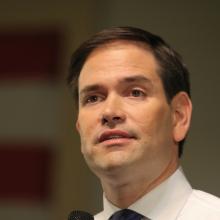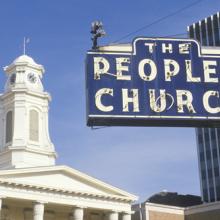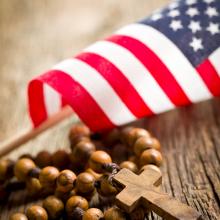christian nation
ALMOST HALF OF Americans believe the United States should be a “Christian nation,” according to a survey this fall, and a significant percentage say that the Bible should have more sway than the will of the people in shaping U.S. laws when the two conflict. The opinions expressed in the October survey by the Pew Research Center break along party lines, with three-quarters of Republicans (and less than half of Democrats) saying the founders intended for the country to be a Christian nation, and 4 in 10 Republicans (compared to 16 percent of Democrats) believing that the Bible, rather than majority rule, should be the source of the nation’s laws. (A similar percentage of Republicans — 39 percent — surveyed by the American Enterprise Institute in 2021 said that political violence may be necessary to “protect America.”) This summer, Republican Rep. Marjorie Taylor Greene declared that “We need to be the party of nationalism, and I’m a Christian, and I say it proudly, we should be Christian nationalists.”
While it may seem that a portion of one of the country’s two main parties has wandered off to never-never land, the survey doesn’t mean the country is heading toward theocracy—yet. Most of the respondents who say the U.S. should be a Christian nation, according to Pew, “are thinking of some definition of the term other than a government-imposed theocracy.” (A small minority, in the words of one respondent, view Christian nationalism as a way “to use the government to impose an extreme, fringe version of Christianity on everyone in the nation, regardless of others’ religious views. They are no different than al-Qaida or the Taliban.”)
If you don’t need or want insurance, some ask, why should you have to pay for other people’s coverage?
I know people who think this way, and they resent having the government obligate them to pay into the system.
Understanding that many Americans struggle and pay a high cost under the Affordable Care Act, we cannot really blame some for holding this position. But responsible citizenship compels us to take a broader view.

Marco Rubio in Iowa. Rich Koele / Shutterstock.com
Rubio is doing his best to sound like an evangelical Christian. Last night he spoke about his faith more than he has done in all the other GOP debates combined. From what I have read, Rubio attends both a Catholic church and an evangelical megachurch. His spiritual commitment seems sincere. I have no doubt that he is a man of faith. But the way he used his religion last night made the Christian gospel subservient to his political ambitions.
The recently released Pew Research Center Report has revealed that Christianity within the United States is on the decline. Christians are freaking out and the fear mongering has begun — many seeing it as an apocalyptic sign of the moral downfall of our secular society coinciding with a theological weakening caused by “liberalism.”
Everyone seems to have an explanation of the data, and among Christians, the infighting has already begun, with most denominations rationalizing their growth, decline, or stagnancy by offering the same explanation: We’re theologically sound and remaining faithful to God while everyone else is getting it wrong.
What Christians must understand — and accept — about these statistics is that religious data about a country doesn’t accurately reflect its corporate actions pertaining to following Christ.
AS WE SWING into the 2016 presidential campaign, we Americans can be certain of at least one thing: We will be treated to another round of very public arguments about the role of religion in our republic. If this were a boxing match, and if past patterns persist, the title of the bout would be Christian Nation vs. Secular Country. The sides, more eager to mobilize their own than have a conversation with the other, will happily seek to bludgeon one another.
Thankfully, a number of writers have set out to complicate this picture in a way that adds both color and hope. Peter Manseau’s One Nation, Under Gods and Denise Spellberg’s Thomas Jefferson’s Quran are beautifully written accounts of our interfaith country. By interfaith, I mean both that there were people of different faith persuasions present from our earliest days, and that they constantly bumped into one another as they established their communities and sought to build up this country.
A recent survey found that 57 percent of Republicans agreed that Christianity should be established as the United States’ national religion.
Not only would this violate the clear wording of the Constitution and the intention of the founders to keep religion and government separate, it also raises a difficult quandary.
Whose Christianity?
Of the estimated 1,500-plus Christian denominations in the U.S., which flavor of Christianity would emerge as the national standard?
Would it be conservative Christianity or liberal Christianity? Would it be Roman Catholic, Protestant, Orthodox, or nondenominational? Would it be church-centered Christianity or a more personal flavor, such as house communion? Would it be the 1950s-style neighborhood-church Christianity that many older churchgoers yearn for, or a contemporary megachurch?
Right-wing Christians and the politicians who pander to them like to say that the United States was, is and always should be a “Christian nation.”
Why, then, are they so obsessed about money and political power and so determined to make people afraid?
After all, Jesus spent an estimated two-thirds of his teaching time on wealth and power. His message was clear, if radical: Give wealth away rather than build bigger barns. Submit to others rather than seek power. Love your enemies rather than smite them.
Moreover, his one new commandment was equally clear: Don’t be afraid. Live without fear. Live in trust and confidence. Live in harmony. Make peace. But whatever happens, don’t be afraid.
Instead of preaching a gospel of self-sacrifice and generosity, right-wing Christians support the mega-wealthy who yearn to stifle democracy and move us further toward plutocracy: Keep the riffraff from voting. Keep alternative views out. Live in the bubble of like-minded people, not the marketplace of ideas and diversity where Jesus lived.
I don’t know about you, and the people you know, but most people I know who call themselves Christians are particularly proud of the certainty that they are ‘good enough’.
It’s an odd phrase when you think about it; in a world simmering with chaos, injustice and upheaval, oppression, poverty and human trafficking, in our cities filled with addiction and unrest, our prisons cramped and over-flowing, do any of us really believe that the best we can do is ‘good enough’?
Can many of us actually congratulate ourselves, or our faith communities for our impact on our neighborhoods, schools or cities?
It’s become a disturbing trend among Christians to lament the downfall of our nation’s “Christian identity” — to judge and criticize the spiritual downfall of the current generation. They boast about the glorious past and predict an apocalyptic demise for the future — brought on by the secularization and ethical demise of our society.
This attitude is based around a sense of fear, judgment, cynicism, fatalism, and hopelessness.
Many Christians today use the term “post-Christian” to describe the United States in conjunction with their assumptions that our nation is falling deeper and deeper into a moral decline, but this word presupposes that we were Christian to begin with. We weren’t.
Shrill voices, backed by vast ad spending, are trying to turn Americans against each other. And not just in vocal and behavioral disagreement, but to a depth of fear and hatred that could turn violent with little provocation.
Is it working?
To judge by the shrill echoes of shrill voices, the right wing is arming for battle, with God on their side, the flag as their shield, and the future of a white Christian nation at stake. Foolhardy politicians egg them on, and the greedy rich seem to believe that they can turn this hatred on and off to suit their quest for tax breaks.
Do the shrill represent any force larger than their own passions? Will the common-sense middle prove more durable and extensive than zealots want to believe?








